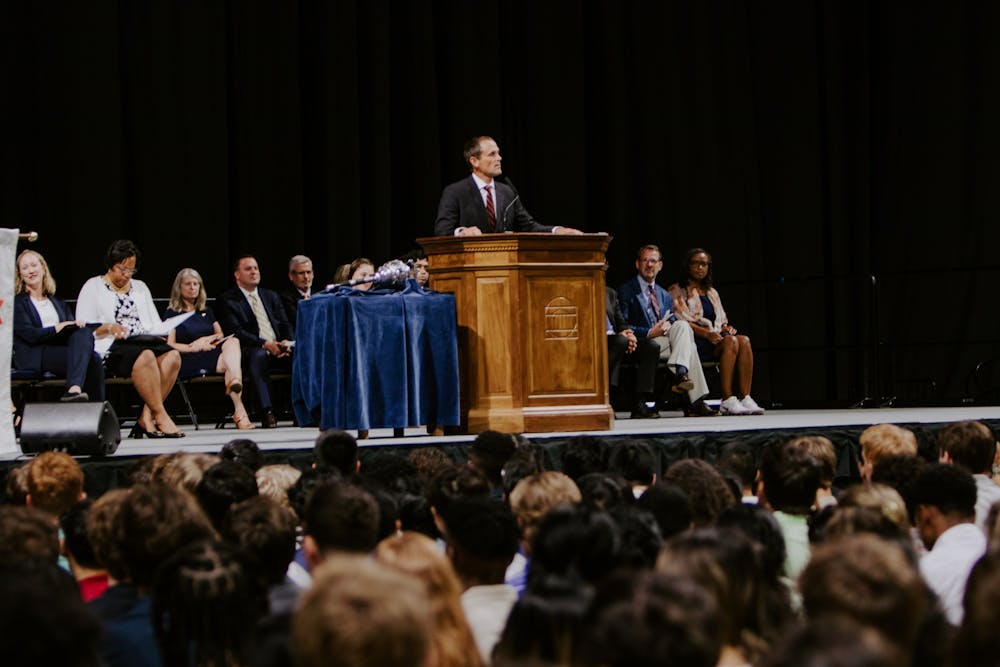The President’s Opening Convocation and Honor Induction took place in John Paul Jones Arena Sunday after the event was moved inside due to inclement weather. The Class of 2026 and transfer students heard from Class of 1994 alumnus Michael Lenox, Tayloe Murphy, professor of business administration and senior associate dean and chief strategy officer, University President Jim Ryan and several other leaders in the University community.
Robyn Hadley, vice president for student affairs and dean of students, delivered opening remarks. Hadley encouraged the Class of 2026 to think about the many roles they will play in the University community before reading a letter from the Seven Society.
“This place is now yours, and you are an integral piece of this community,” the letter read. “As you grow, the University grows alongside you.”
Ryan then gave a welcome address to the new students and emphasized that every student has an important path ahead of them at the University.
“Whether you're first generation or fifth generation, college will open doors for you and shake your life in ways that many of you probably can't even imagine at this point, and you will look back on your time here — I am confident — as four of the best, most enjoyable, most thrilling and most important years in your life,” Ryan said.
The Class of 2026 is the most diverse class in University history. Of the 4,053 first-year students, a record 52.9 percent identify as students of color, while 16 percent are first-generation college students.
One prevailing theme of this year’s convocation was the importance of free speech. Ryan noted that although not all ideas are equally as good, every idea deserves consideration.
“Our commitment to free inquiry instead reflects the view that every idea must be heard, so that it may be subjected to the rigorous scrutiny necessary to advance knowledge,” Ryan said. “This process requires deep critical engagement as well as humility and a recognition that many commonly accepted views have proven mistaken.”
Free speech has been the subject of much discussion over the past several years, from controversy over Lawn room signage, to a controversial event featuring former vice president Mike Pence to recent Board of Visitors appointee Bert Ellis’ behavior as a student in the 1970s. The Board of Visitors endorsed a public statement affirming the University’s commitment to free speech and inquiry last year.
Leslie Kendrick, director of the Center for the First Amendment, similarly urged the Class of 2026 to keep free speech forefront in their minds during their time at the University.
“Frame freedom of expression as part of the main thing you're here to do — learn,” Kendrick said. “Free expression has particular and special importance to universities.”
Another important topic was the enduring influence of the Honor system, particularly in light of recent changes. In March, students voted to reduce the single-sanction of expulsion to a two-semester leave of absence — the largest change in the Honor system’s history.
Gabrielle Bray, chair of the Honor Committee and fourth-year College student, said she remains optimistic about the pivotal role Honor plays.
“I spoke with folks who believe Honor’s dead and believe Honor should die,” Bray said. “And yet I stand before you relentlessly optimistic about the value of Honor in this community and so excited that you get to mark your entrance into the community of trust by signing the Honor scrolls.”
Lenox — who was part of the Honor Committee himself during his time at the University — emphasized that the Honor system is the foundation of the University community.
“I want to emphasize what makes the U.Va. Honor system distinct is that it is a student self-governance system,” Lenox said. “It is not run by the administration, it is not run by the faculty. It is your system. You alone determine the standards by which you hold one another.”
Nabeel Raza, chair of the University Judiciary Committee and fourth-year College student, reminded the Class of 2026 that everyone will take a different path at the University.
Ceci Cain, president of Student Council and graduate student, directed first years to the legacy of Linda Quarles, the first woman to serve as president of the Black Student Alliance and a pioneer for the creation of the Office of African American Affairs in the 1970s. Cain encouraged students to challenge norms and inspire change for the better, just as Quarles did.
“We must call out inequity even when it seems unreasonable,” Cain said. “As president of Student Council, I want you to know that that's exactly the point. One of the best parts of U.Va. is that here, I can dare you to be unreasonable in the best sense of the word.”
Ryan concluded by asking new students to keep an open mind in their search for the truth.
“If you remember nothing else from this speech, please remember this, as it will help you across these four years and beyond — be curious, not judgmental,” Ryan said. “This, among other things, is how you learn, how you leave yourself open to getting past the surface of things and getting to the heart and truth.”







